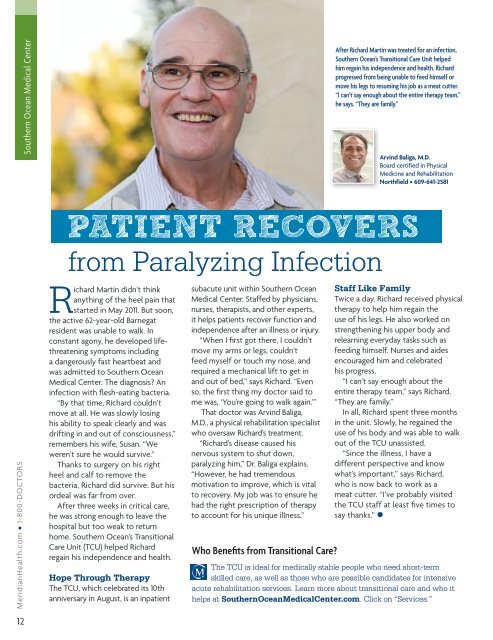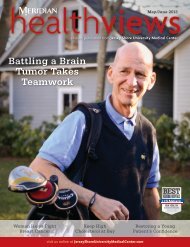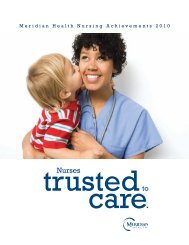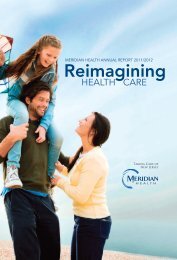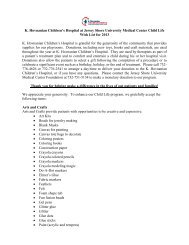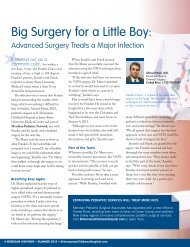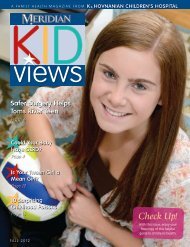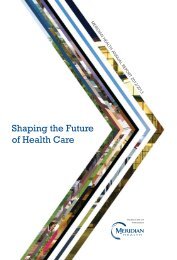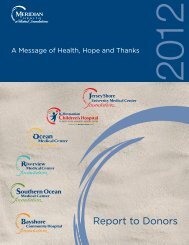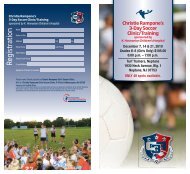Download the January/February Issue - Jersey Shore Medical Center
Download the January/February Issue - Jersey Shore Medical Center
Download the January/February Issue - Jersey Shore Medical Center
Create successful ePaper yourself
Turn your PDF publications into a flip-book with our unique Google optimized e-Paper software.
Sou<strong>the</strong>rn Ocean <strong>Medical</strong> <strong>Center</strong><br />
After Richard Martin was treated for an infection,<br />
Sou<strong>the</strong>rn Ocean’s Transitional Care Unit helped<br />
him regain his independence and health. Richard<br />
progressed from being unable to feed himself or<br />
move his legs to resuming his job as a meat cutter.<br />
“I can’t say enough about <strong>the</strong> entire <strong>the</strong>rapy team,”<br />
he says. “They are family.”<br />
Arvind Baliga, M.D.<br />
Board certified in Physical<br />
Medicine and Rehabilitation<br />
Northfield • 609-641-2581<br />
MeridianHealth.com • 1-800-DOCTORS<br />
from Paralyzing Infection<br />
Richard Martin didn’t think<br />
anything of <strong>the</strong> heel pain that<br />
started in May 2011. But soon,<br />
<strong>the</strong> active 62-year-old Barnegat<br />
resident was unable to walk. In<br />
constant agony, he developed lifethreatening<br />
symptoms including<br />
a dangerously fast heartbeat and<br />
was admitted to Sou<strong>the</strong>rn Ocean<br />
<strong>Medical</strong> <strong>Center</strong>. The diagnosis? An<br />
infection with flesh-eating bacteria.<br />
“By that time, Richard couldn’t<br />
move at all. He was slowly losing<br />
his ability to speak clearly and was<br />
drifting in and out of consciousness,”<br />
remembers his wife, Susan. “We<br />
weren’t sure he would survive.”<br />
Thanks to surgery on his right<br />
heel and calf to remove <strong>the</strong><br />
bacteria, Richard did survive. But his<br />
ordeal was far from over.<br />
After three weeks in critical care,<br />
he was strong enough to leave <strong>the</strong><br />
hospital but too weak to return<br />
home. Sou<strong>the</strong>rn Ocean’s Transitional<br />
Care Unit (TCU) helped Richard<br />
regain his independence and health.<br />
Hope Through Therapy<br />
The TCU, which celebrated its 10th<br />
anniversary in August, is an inpatient<br />
subacute unit within Sou<strong>the</strong>rn Ocean<br />
<strong>Medical</strong> <strong>Center</strong>. Staffed by physicians,<br />
nurses, <strong>the</strong>rapists, and o<strong>the</strong>r experts,<br />
it helps patients recover function and<br />
independence after an illness or injury.<br />
“When I first got <strong>the</strong>re, I couldn’t<br />
move my arms or legs, couldn’t<br />
feed myself or touch my nose, and<br />
required a mechanical lift to get in<br />
and out of bed,” says Richard. “Even<br />
so, <strong>the</strong> first thing my doctor said to<br />
me was, ‘You’re going to walk again.’”<br />
That doctor was Arvind Baliga,<br />
M.D., a physical rehabilitation specialist<br />
who oversaw Richard’s treatment.<br />
“Richard’s disease caused his<br />
nervous system to shut down,<br />
paralyzing him,” Dr. Baliga explains.<br />
“However, he had tremendous<br />
motivation to improve, which is vital<br />
to recovery. My job was to ensure he<br />
had <strong>the</strong> right prescription of <strong>the</strong>rapy<br />
to account for his unique illness.”<br />
Who Benefits from Transitional Care?<br />
Staff Like Family<br />
Twice a day, Richard received physical<br />
<strong>the</strong>rapy to help him regain <strong>the</strong><br />
use of his legs. He also worked on<br />
streng<strong>the</strong>ning his upper body and<br />
relearning everyday tasks such as<br />
feeding himself. Nurses and aides<br />
encouraged him and celebrated<br />
his progress.<br />
“I can’t say enough about <strong>the</strong><br />
entire <strong>the</strong>rapy team,” says Richard.<br />
“They are family.”<br />
In all, Richard spent three months<br />
in <strong>the</strong> unit. Slowly, he regained <strong>the</strong><br />
use of his body and was able to walk<br />
out of <strong>the</strong> TCU unassisted.<br />
“Since <strong>the</strong> illness, I have a<br />
different perspective and know<br />
what’s important,” says Richard,<br />
who is now back to work as a<br />
meat cutter. “I’ve probably visited<br />
<strong>the</strong> TCU staff at least five times to<br />
say thanks.” •<br />
The TCU is ideal for medically stable people who need short-term<br />
skilled care, as well as those who are possible candidates for intensive<br />
acute rehabilitation services. Learn more about transitional care and who it<br />
helps at Sou<strong>the</strong>rnOcean<strong>Medical</strong><strong>Center</strong>.com. Click on “Services.”<br />
12


